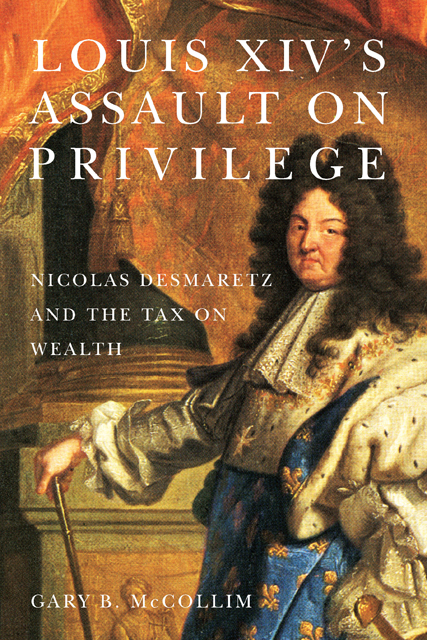Book contents
- Frontmatter
- Dedication
- Contents
- List of Illustrations
- Preface
- List of Abbreviations
- Introduction
- 1 The Fiscal System under Louis XIV
- 2 The Rise of the Administrative Monarchy
- 3 Nicolas Desmaretz and Company
- 4 Handling Ideas for Reform
- 5 The Establishment of the Dixième
- 6 After the Dixième
- Conclusion
- Appendix 1 The Conseil d’en haut, or the Council of Ministers
- Appendix 2 Members of the Royal Council of Finances under Louis XIV
- Appendix 3 Controllers General, Directors, and Intendants of Finances
- Appendix 4 Glossary of Terms
- Notes
- Bibliography
- Index
3 - Nicolas Desmaretz and Company
Published online by Cambridge University Press: 14 February 2023
- Frontmatter
- Dedication
- Contents
- List of Illustrations
- Preface
- List of Abbreviations
- Introduction
- 1 The Fiscal System under Louis XIV
- 2 The Rise of the Administrative Monarchy
- 3 Nicolas Desmaretz and Company
- 4 Handling Ideas for Reform
- 5 The Establishment of the Dixième
- 6 After the Dixième
- Conclusion
- Appendix 1 The Conseil d’en haut, or the Council of Ministers
- Appendix 2 Members of the Royal Council of Finances under Louis XIV
- Appendix 3 Controllers General, Directors, and Intendants of Finances
- Appendix 4 Glossary of Terms
- Notes
- Bibliography
- Index
Summary
Nicolas Desmaretz, the second son of Jean Desmaretz and Marie Colbert, was born in Soissons on September 10, 1648. He studied rhetoric and philosophy at a Jesuit school in Reims but did not complete his studies. His uncle Jean-Baptiste Colbert called him, at the age of fifteen, to the contrôle général des finances, where his parents corresponded with Colbert about his activities.
In the eighteenth century the Desmaretz family claimed four generations of magistrates prior to Nicolas. We do know that Nicolas’s grandfather was a procureur du roi in the bailliage of Vermandois and substitute procureur general in Laon at his death in 1611 at age thirty-five. These facts stand in sharp contrast to Saint-Simon’s claim that Desmaretz’s grandfather had begun life as a manant gros laboureur (wealthy landowning peasant) who enriched himself as the steward of the estates of the abbey at Ourscamp near Noyon.
Saint-Simon also said that Colbert raised the Desmaretz family from obscurity. Jean Desmaretz, who was born in 1608 and was thus three years old when his father died, bought an office of treasurer of France in the Soissons Bureau of Finances in 1634, after having been a receiver of the taillon for the generality. He held the office of treasurer of France when he married Marie Colbert on June 25, 1646, when Jean-Baptiste Colbert was merely a commissaire des guerres and secretary to Michel Le Tellier. The Colbert family borrowed heavily to provide a dowry of 40,000 livres for Marie, thus indicating an equal match between an upwardly mobile family of secondary magistrates from Soissons and a family of drapers-turnedroyal servants from Reims. As a result of the heavy sacrifices made to get this match, Marie Colbert was the only one of Colbert’s sisters who married; four other sisters became nuns. If anything, the Desmaretz clan was superior to the Colbert clan, except that Colbert’s ties to the court foreshadowed a possibly bright future.
After 1661 Jean Desmaretz’s career was tied to Colbert’s rise in the government. As a member of the Bureau of Finances of Soissons, Jean assisted the provincial intendant on tax matters and often performed the duties of the provincial intendant during the latter’s absences from 1664 until his own death in 1682.
- Type
- Chapter
- Information
- Louis XIV's Assault on PrivilegeNicolas Desmaretz and the Tax on Wealth, pp. 89 - 127Publisher: Boydell & BrewerPrint publication year: 2012

